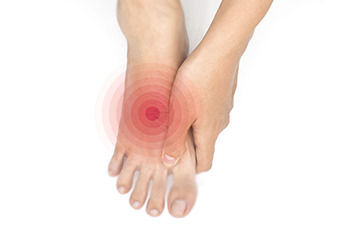Items filtered by date: November 2024
Understanding Gout in Women

While often associated with men, gout can affect women too, especially after menopause. Gout is a form of arthritis caused by high levels of uric acid in the blood, leading to painful crystals forming in the joints, particularly in the big toe. Estrogen, which helps regulate uric acid, declines post-menopause, increasing women’s risk of gout. Other factors like high blood pressure, obesity, and a diet rich in purines, found in red meat, shellfish, and alcohol, can also raise uric acid levels. Gout attacks come on suddenly, causing intense pain, redness, and swelling in the affected joint. Managing gout involves drinking plenty of water, avoiding purine-rich foods, and maintaining a healthy weight. If you have gout flare-ups, it is suggested that you visit a podiatrist who may prescribe medications to lower uric acid or relieve pain.
Gout is a foot condition that requires certain treatment and care. If you are seeking treatment, contact one of our podiatrists from The Foot Specialists. Our doctors will treat your foot and ankle needs.
What Is Gout?
Gout is a type of arthritis caused by a buildup of uric acid in the bloodstream. It often develops in the foot, especially the big toe area, although it can manifest in other parts of the body as well. Gout can make walking and standing very painful and is especially common in diabetics and the obese.
People typically get gout because of a poor diet. Genetic predisposition is also a factor. The children of parents who have had gout frequently have a chance of developing it themselves.
Gout can easily be identified by redness and inflammation of the big toe and the surrounding areas of the foot. Other symptoms include extreme fatigue, joint pain, and running high fevers. Sometimes corticosteroid drugs can be prescribed to treat gout, but the best way to combat this disease is to get more exercise and eat a better diet.
If you have any questions please feel free to contact our offices located in Waltham and Milford, MA . We offer the newest diagnostic and treatment technologies for all your foot and ankle needs.
Learning How to Care for Your Feet

Learning how to care for your feet from a podiatrist offers personalized insights and expert guidance. During a consultation, a podiatrist can evaluate your specific foot health needs and recommend a care routine tailored to you. This can include advice on proper hygiene, such as washing and drying techniques, the best moisturizers to use, and how to prevent fungal infections. They can also demonstrate safe ways to trim toenails and care for calluses without causing injury. Podiatrists provide guidance on choosing the right shoes for your foot shape and lifestyle, which is essential for comfort and preventing problems. They may also suggest simple exercises to improve foot strength and flexibility, which can help prevent falls. If you would like to start a regular foot care routine, it is suggested that you visit a podiatrist for regular check-ups.This type of doctor can not only help with immediate concerns but also provide valuable education on maintaining lifelong foot health.
Everyday foot care is very important to prevent infection and other foot ailments. If you need your feet checked, contact one of our podiatrists from The Foot Specialists. Our doctors can provide the care you need to keep you pain-free and on your feet.
Everyday Foot Care
Often, people take care of their bodies, face and hair more so than they do for their feet. But the feet are a very important aspect of our bodies, and one that we should pay more attention to. Without our feet, we would not be able to perform most daily tasks.
It is best to check your feet regularly to make sure there are no new bruises or cuts that you may not have noticed before. For dry feet, moisturizer can easily be a remedy and can be applied as often as necessary to the affected areas. Wearing shoes that fit well can also help you maintain good foot health, as well as making it easier to walk and do daily activities without the stress or pain of ill-fitting shoes, high heels, or even flip flops. Wearing clean socks with closed shoes is important to ensure that sweat and bacteria do not accumulate within the shoe. Clean socks help to prevent Athlete’s foot, fungi problems, bad odors, and can absorb sweat.
If you have any questions please feel free to contact our offices located in Waltham and Milford, MA . We offer the newest diagnostic and treatment technologies for all your foot and ankle needs.
What Is a Foot Stress Fracture?

Stress fractures are tiny cracks in the bones of the foot, often caused by repetitive pressure or overuse. They are sometimes referred to as hairline fractures. Commonly seen in athletes, these fractures can occur due to sudden increases in activity, wearing improper footwear, or training on hard surfaces. They are particularly prevalent in sports that involve running or jumping. Symptoms typically include localized pain that worsens with activity, swelling, and tenderness when pressure is applied to the affected area. In some cases, bruising may also be visible. A podiatrist plays a critical role in diagnosing and treating stress fractures. They may perform a physical examination and imaging tests, such as X-rays or MRI scans to confirm the injury. Treatment often includes rest and elevation, along with recommendations for appropriate footwear and activity modifications. If you suspect a stress fracture, it is suggested that you schedule an appointment with a podiatrist for accurate diagnosis and effective management.
Activities where too much pressure is put on the feet can cause stress fractures. To learn more, contact one of our podiatrists from The Foot Specialists. Our doctors can provide the care you need to keep your pain free and on your feet.
Dealing with Stress Fractures of the Foot and Ankle
Stress fractures occur in the foot and ankle when muscles in these areas weaken from too much or too little use. The feet and ankles then lose support when walking or running from the impact of the ground. Since there is no protection, the bones receive the full impact of each step. Stress on the feet can cause cracks to form in the bones, thus creating stress fractures.
What Are Stress Fractures?
Stress fractures occur frequently in individuals whose daily activities cause great impact on the feet and ankles. Stress factors are most common among:
- Runners
- People affected with Osteoporosis
- Tennis or basketball players
- Gymnasts
- High impact workouts
Symptoms
Pain from the fractures occur in the area of the fractures and can be constant or intermittent. It will often cause sharp or dull pain with swelling and tenderness. Engaging in any kind of activity which involves high impact will aggravate pain.
If you have any questions please feel free to contact our offices located in Waltham and Milford, MA . We offer the newest diagnostic and treatment technologies for all your foot and ankle needs.
Diabetes and the Danger of Peripheral Neuropathy

Diabetes significantly affects the feet, often leading to serious complications if not managed properly. High blood sugar levels can damage blood vessels and nerves, reducing circulation and sensation in the feet. This condition, known as diabetic neuropathy, means that injuries like cuts, blisters, or sores may go unnoticed, increasing the risk of infection. Poor circulation in diabetic individuals also delays wound healing, making it more difficult for minor injuries to recover. Over time, untreated wounds can turn into ulcers, which, if infected, may lead to severe consequences, including gangrene or even amputation. Foot deformities, such as bunions and hammertoes, are more common in people with diabetes due to weakened muscles and tendons. Regular foot care, including daily inspections, proper footwear, and regular check-ups with a podiatrist, is essential to avoid complications and maintain foot health in diabetics. For this reason, it is suggested that if you have diabetes, you make an appointment with a podiatrist for routine care.
Neuropathy
Neuropathy can be a potentially serious condition, especially if it is left undiagnosed. If you have any concerns that you may be experiencing nerve loss in your feet, consult with one of our podiatrists from The Foot Specialists. Our doctors will assess your condition and provide you with quality foot and ankle treatment for neuropathy.
What Is Neuropathy?
Neuropathy is a condition that leads to damage to the nerves in the body. Peripheral neuropathy, or neuropathy that affects your peripheral nervous system, usually occurs in the feet. Neuropathy can be triggered by a number of different causes. Such causes include diabetes, infections, cancers, disorders, and toxic substances.
Symptoms of Neuropathy Include:
- Numbness
- Sensation loss
- Prickling and tingling sensations
- Throbbing, freezing, burning pains
- Muscle weakness
Those with diabetes are at serious risk due to being unable to feel an ulcer on their feet. Diabetics usually also suffer from poor blood circulation. This can lead to the wound not healing, infections occurring, and the limb may have to be amputated.
Treatment
To treat neuropathy in the foot, podiatrists will first diagnose the cause of the neuropathy. Figuring out the underlying cause of the neuropathy will allow the podiatrist to prescribe the best treatment, whether it be caused by diabetes, toxic substance exposure, infection, etc. If the nerve has not died, then it’s possible that sensation may be able to return to the foot.
Pain medication may be issued for pain. Electrical nerve stimulation can be used to stimulate nerves. If the neuropathy is caused from pressure on the nerves, then surgery may be necessary.
If you have any questions, please feel free to contact our offices located in Waltham and Milford, MA . We offer the newest diagnostic and treatment technologies for all your foot care needs.
